447 scholarly books by Seagull Books and 19
have author last names that start with T
447 scholarly books by Seagull Books and 19
447 scholarly books by Seagull Books
19 have author last names that start with T have author last names that start with T
19 have author last names that start with T have author last names that start with T
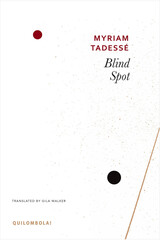
Blind Spot
Myriam Tadessé
Seagull Books, 2021
Set in the entertainment world in France, this searing memoir explores the realities of being a mixed or biracial French citizen.
In Blind Spot, Myriam Tadessé exposes the difficulty, even the impossibility, for France to truly understand and celebrate the lived realities of mixed or biracial French citizens. What the French word métis—which translates to “half-breed” or “mixed-race”—hides is how central the notion of race actually is in a society that claims to repudiate it. The French film and theater world, in which Tadessé has made her career, appears unable to confront the individuality of the performers. They are required to correspond to categories—often based on race—that don’t allow for biracial identities. This classification not only contradicts France’s asserted ideals but also views as anomalies those who defy ethno-racial assumptions.
Drawing on her personal experiences as a biracial Ethiopian-French woman and her family history, Tadessé explores the realities of life for mixed-race individuals in France through her searing and honest memoir.
In Blind Spot, Myriam Tadessé exposes the difficulty, even the impossibility, for France to truly understand and celebrate the lived realities of mixed or biracial French citizens. What the French word métis—which translates to “half-breed” or “mixed-race”—hides is how central the notion of race actually is in a society that claims to repudiate it. The French film and theater world, in which Tadessé has made her career, appears unable to confront the individuality of the performers. They are required to correspond to categories—often based on race—that don’t allow for biracial identities. This classification not only contradicts France’s asserted ideals but also views as anomalies those who defy ethno-racial assumptions.
Drawing on her personal experiences as a biracial Ethiopian-French woman and her family history, Tadessé explores the realities of life for mixed-race individuals in France through her searing and honest memoir.
[more]
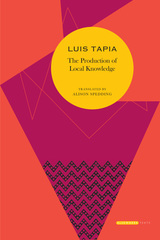
The Production of Local Knowledge
History and Politics in the Work of René Zavaleta Mercado
Luis Tapia Mealla
Seagull Books, 2016
This volume presents a comprehensive examination of the work of René Zavaleta Mercado (1939–1984), the most notable Bolivian political thinker of the twentieth century. While Zavaleta did not live to see the triumph of the indigenous social movements that have made Bolivia famous in recent years, his writings influenced many of the activists and ideologues who made today’s changes possible. This exploration of Zavaleta’s work by Luis Tapia, a contemporary political analyst who has been a colleague of many of the central actors in today’s government, presents a detailed panorama of Bolivian history that establishes the context of Zavaleta’s analysis of the events of his time, from the revolutionary nationalist movement which took power in 1952 through the military dictatorships that followed it from 1964 onwards to the popular protests that eventually defeated the dictatorship and restored democratic government in 1982. The book will be necessary reading for anyone who wants to understand the decades of history and the ideological currents that laid the groundwork for the rise to power of the neo-indigenists lead by Evo Morales in the twenty-first century.
[more]
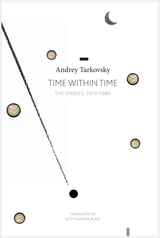
Time within Time
The Diaries, 1970–1986
Andrei Tarkovsky
Seagull Books, 2019
“Tarkovsky for me is the greatest,” wrote Ingmar Bergman. Andrey Tarkovsky only made seven films, but all are celebrated for its striking visual images, quietly patient dramatic structures, and visionary symbolism.
Time within Time is both a diary and a notebook, maintained by Tarkovsky from 1970 until his death. Intense and intimate, it offers reflections on Dostoyevsky, Tolstoy, Hermann Hesse, Thomas Mann, and others. He writes movingly of his family, especially his father, Arseniy Tarkovsky, whose poems appear in his films. He records haunting dreams in detail and speaks of the state of society and the future of art, noting significant world events and purely personal dramas along with fascinating accounts of his own filmmaking. Rounding out this volume are Tarkovsky’s plans and notes for his stage version of Hamlet; a detailed proposal for a film adaptation of Dostoyevsky’s The Idiot; and a glimpse of the more public Tarkovsky answering questions put to him by interviewers.
Time within Time is both a diary and a notebook, maintained by Tarkovsky from 1970 until his death. Intense and intimate, it offers reflections on Dostoyevsky, Tolstoy, Hermann Hesse, Thomas Mann, and others. He writes movingly of his family, especially his father, Arseniy Tarkovsky, whose poems appear in his films. He records haunting dreams in detail and speaks of the state of society and the future of art, noting significant world events and purely personal dramas along with fascinating accounts of his own filmmaking. Rounding out this volume are Tarkovsky’s plans and notes for his stage version of Hamlet; a detailed proposal for a film adaptation of Dostoyevsky’s The Idiot; and a glimpse of the more public Tarkovsky answering questions put to him by interviewers.
[more]
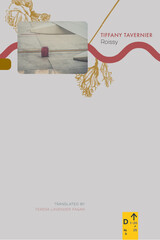
Roissy
Tiffany Tavernier
Seagull Books, 2021
Disguised as a passenger, a homeless woman lives in Paris’s Roissy airport until she meets a man who makes her confront her past.
Every day the narrator of this gripping novel hurries from one terminal to another in Charles de Gaulle Roissy airport, Paris, pulling her suitcase behind her, talking to people she meets—but she never boards an airplane. She becomes an “unnoticeable,” a homeless woman disguised as a passenger, protected by her anonymity. When a man who comes to the airport every day to await the Rio-to-Paris flight—the same route on which a plane crashed into the sea a few years earlier—attempts to approach her, she flees, terrified. But eventually, she accepts his kindness and understands his loss, and she gives in to the grief they share, forming a bond with him that becomes more than friendship. A magnificent portrait of a woman who rediscovers herself through a chance connection, Roissy is a powerful, polyphonic book, a glimpse at the infinite capacity of the human spirit to be reborn.
Every day the narrator of this gripping novel hurries from one terminal to another in Charles de Gaulle Roissy airport, Paris, pulling her suitcase behind her, talking to people she meets—but she never boards an airplane. She becomes an “unnoticeable,” a homeless woman disguised as a passenger, protected by her anonymity. When a man who comes to the airport every day to await the Rio-to-Paris flight—the same route on which a plane crashed into the sea a few years earlier—attempts to approach her, she flees, terrified. But eventually, she accepts his kindness and understands his loss, and she gives in to the grief they share, forming a bond with him that becomes more than friendship. A magnificent portrait of a woman who rediscovers herself through a chance connection, Roissy is a powerful, polyphonic book, a glimpse at the infinite capacity of the human spirit to be reborn.
[more]

Performing Stories
Narrative as Performance
Nina Tecklenburg
Seagull Books, 2020
Retelling performances, collecting things, reading traces, mapping memories, gaming autobiographies: in European and Anglo-American theater since the turn of the millennium, a range of new nonliterary narrative practices such as these have taken root. Unable to be subsumed under a well-established narratological, dramatic, or postdramatic perspective, they call for a reexamination of the relationship between performance and narration. Performing Stories seeks to reconceptualize narrative against the backdrop of innovative theater formats such as collective storytelling games, theater installations, extensive autobiographical performances, immersive role-playing, and audio-video walks.
Nina Tecklenburg’s focus lies on narration less as literary composition than as sensate, embodied cultural practice—a participatory and open process that fosters social relationships. She gives central importance to the forces of narration that create and undo culture and politics. A foundational new book, Performing Stories presents a groundbreaking transdisciplinary perspective through new approaches that are stimulating to performance studies, narrative and cultural theory, literary criticism, and game and video studies.
Nina Tecklenburg’s focus lies on narration less as literary composition than as sensate, embodied cultural practice—a participatory and open process that fosters social relationships. She gives central importance to the forces of narration that create and undo culture and politics. A foundational new book, Performing Stories presents a groundbreaking transdisciplinary perspective through new approaches that are stimulating to performance studies, narrative and cultural theory, literary criticism, and game and video studies.
[more]

Our History, Their History, Whose History?
Romila Thapar
Seagull Books, 2023
An overview of nationalism and its impact on the study of history from one of India’s most prominent historians.
In this timely book, historian Romila Thapar delves into the complex world of nationalism and its impact on the interpretations of the past and on the discipline of history itself. History, she expounds, is no mere collection of information and chronology, and its purpose extends well beyond storytelling.
Recognizing nationalism as a powerful force that gives rise to various narratives that provide ancestry to communities and shape the direction of societies, Thapar explores how, in India, two conflicting notions of nationalism have evolved and shaped the idea of the nation. Today, one such nationalistic theory claims the victimization of one religious community by another through centuries of “misrule.” Such a claim willfully ignores ample evidence to the contrary to suit a particular political and ideological purpose. Thapar counters such attempts at misrepresentation by citing several historical instances of the nuanced interface and intermingling of cultures, as well as by showing how today’s conflicts have their roots in the British colonial construction of India’s history. She also addresses the recent controversy surrounding the deletions of sections of Indian history textbooks published by NCERT, the Indian educational council, and suggests that the intention is more likely to be the promotion of a particular reading of history that conforms to the ideology of those in power.
Engaging and thought-provoking, Our History, Their History, Whose History? invites readers to question the authenticity of historical narratives touted by one group of nationalists, and it explores the clash between professional historians who study the past to understand our inherited present and fabricators who wield history for political gain.
In this timely book, historian Romila Thapar delves into the complex world of nationalism and its impact on the interpretations of the past and on the discipline of history itself. History, she expounds, is no mere collection of information and chronology, and its purpose extends well beyond storytelling.
Recognizing nationalism as a powerful force that gives rise to various narratives that provide ancestry to communities and shape the direction of societies, Thapar explores how, in India, two conflicting notions of nationalism have evolved and shaped the idea of the nation. Today, one such nationalistic theory claims the victimization of one religious community by another through centuries of “misrule.” Such a claim willfully ignores ample evidence to the contrary to suit a particular political and ideological purpose. Thapar counters such attempts at misrepresentation by citing several historical instances of the nuanced interface and intermingling of cultures, as well as by showing how today’s conflicts have their roots in the British colonial construction of India’s history. She also addresses the recent controversy surrounding the deletions of sections of Indian history textbooks published by NCERT, the Indian educational council, and suggests that the intention is more likely to be the promotion of a particular reading of history that conforms to the ideology of those in power.
Engaging and thought-provoking, Our History, Their History, Whose History? invites readers to question the authenticity of historical narratives touted by one group of nationalists, and it explores the clash between professional historians who study the past to understand our inherited present and fabricators who wield history for political gain.
[more]

Voices of Dissent
An Essay
Romila Thapar
Seagull Books, 2020
Written by one of India’s best-known public intellectuals, this book is essential reading for anyone interested in India’s fascinating history as well as the direction in which the nation is headed.
People have argued since time immemorial. Disagreement is a part of life, of human experience. But we now live in times when any form of protest in India is marked as anti-Indian and met with arguments that the very concept of dissent was imported into India from the West. As Romila Thapar explores in her timely historical essay, however, dissent has a long history in the subcontinent, even if its forms have evolved through the centuries.
In Voices of Dissent: An Essay, Thapar looks at the articulation of nonviolent dissent and relates it to various pivotal moments throughout India’s history. Beginning with Vedic times, she takes us from the second to the first millennium BCE, to the emergence of groups that were jointly called the Shramanas—the Jainas, Buddhists, and Ajivikas. Going forward in time, she also explores the views of the Bhakti sants and others of the fifteenth and sixteenth centuries and brings us to a major moment of dissent that helped to establish a free and democratic India: Mahatma Gandhi’s satyagraha. Then Thapar places in context the recent peaceful protests against India’s new, controversial citizenship law, maintaining that dissent in our time must be opposed to injustice and supportive of democratic rights so that society may change for the better.
People have argued since time immemorial. Disagreement is a part of life, of human experience. But we now live in times when any form of protest in India is marked as anti-Indian and met with arguments that the very concept of dissent was imported into India from the West. As Romila Thapar explores in her timely historical essay, however, dissent has a long history in the subcontinent, even if its forms have evolved through the centuries.
In Voices of Dissent: An Essay, Thapar looks at the articulation of nonviolent dissent and relates it to various pivotal moments throughout India’s history. Beginning with Vedic times, she takes us from the second to the first millennium BCE, to the emergence of groups that were jointly called the Shramanas—the Jainas, Buddhists, and Ajivikas. Going forward in time, she also explores the views of the Bhakti sants and others of the fifteenth and sixteenth centuries and brings us to a major moment of dissent that helped to establish a free and democratic India: Mahatma Gandhi’s satyagraha. Then Thapar places in context the recent peaceful protests against India’s new, controversial citizenship law, maintaining that dissent in our time must be opposed to injustice and supportive of democratic rights so that society may change for the better.
[more]
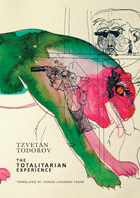
The Totalitarian Experience
Tzvetan Todorov
Seagull Books, 2011
The fall of the Berlin Wall marked the beginning of the collapse of the Soviet Union, as well as many other communist totalitarian regimes around the world. But it would be naive to assume that this historic, symbolic event and its aftermath have completely rid the world of totalitarianism. Instead, we should ask, what is the totalitarian experience and how does it survive today?
This is the imposing question raised by acclaimed philosopher and writer Tzvetan Todorov in this compact, highly personal essay. Here, he recounts his own experiences with totalitarianism in his native Bulgaria and discusses the books he has written in the last twenty years that were devoted to examining such regimes, such as Voices from the Gulag, his influential analysis of Stalinist concentration camps. Through this retrospective investigation, Todorov offers a historical look at communism. He brings together and distills his extensive oeuvre to reveal the essence of totalitarian ideology, the characteristics of daily life under communism, and the irony of democratic messianism.
Bringing his thoughts and insights up to the present, Todorov explores how economic ultraliberalism may be considered just another form of totalitarianism. And his conclusion leads us to ask ourselves another challenging question: Are liberal democratic societies actually totalitarian experiences in disguise?
“In this honed, finely calibrated essay, Todorov refutes the notion that good can be imposed by force. More efficient is to embody one’s values and demonstrate their worth. . . . This is a concise and eloquent defence of what makes us truly human.”—Age, on Torture and the War on Terror
[more]

Omertà
A Book of Silences
Andrea Tompa
Seagull Books, 2024
A rich, layered narrative that explores the indomitable human spirit against the backdrop of Romania’s complex history in the 1950s and ’60s.
A rural area not far from the city of Cluj-Napoca, a former Hungarian province that has been part of Romania since 1920. World War II has ended and the region is under the firm clasp of Stalinist collectivization. In the atmospheric village of Kolozsvár, Omertà unfolds a riveting tale through four poignant perspectives, each peeling back the layers of its central characters’ lives against the backdrop of a tumultuous Eastern Europe in the mid-twentieth century.
Kali, a peasant woman, escapes an abusive marriage to embark on a transformative journey to Kolozsvár, seeking refuge and purpose. She is employed as a maid by Vilmos, a reluctant Communist Party member with an unwavering dedication to his garden. As Vilmos’s botanical brilliance attracts the state’s attention, a clash between personal desires and political obligations ensues. Annush, the third narrator, a lovestruck teenager, becomes entangled in a complex web of emotions, grappling with love, loss, and the evolving landscape of her homeland. The tale deepens with Eleonora, who, seeking solace in a monastery, becomes a casualty of political purges and the suppression of religious faith under Romania’s oppressive regime.
In this epic novel, Romanian-born Hungarian author Andrea Tompa skillfully intertwines these tales, shedding light on the injustices and corruption of a regime that sought to extinguish cultural identities. The lives of Kali, Vilmos, Annush, and Eleonora weave a tapestry of love, resilience, the virtue of roses, and the quiet strength required to endure in the face of political turmoil.
A rural area not far from the city of Cluj-Napoca, a former Hungarian province that has been part of Romania since 1920. World War II has ended and the region is under the firm clasp of Stalinist collectivization. In the atmospheric village of Kolozsvár, Omertà unfolds a riveting tale through four poignant perspectives, each peeling back the layers of its central characters’ lives against the backdrop of a tumultuous Eastern Europe in the mid-twentieth century.
Kali, a peasant woman, escapes an abusive marriage to embark on a transformative journey to Kolozsvár, seeking refuge and purpose. She is employed as a maid by Vilmos, a reluctant Communist Party member with an unwavering dedication to his garden. As Vilmos’s botanical brilliance attracts the state’s attention, a clash between personal desires and political obligations ensues. Annush, the third narrator, a lovestruck teenager, becomes entangled in a complex web of emotions, grappling with love, loss, and the evolving landscape of her homeland. The tale deepens with Eleonora, who, seeking solace in a monastery, becomes a casualty of political purges and the suppression of religious faith under Romania’s oppressive regime.
In this epic novel, Romanian-born Hungarian author Andrea Tompa skillfully intertwines these tales, shedding light on the injustices and corruption of a regime that sought to extinguish cultural identities. The lives of Kali, Vilmos, Annush, and Eleonora weave a tapestry of love, resilience, the virtue of roses, and the quiet strength required to endure in the face of political turmoil.
[more]

The Hangman's House
Andrea Tompa
Seagull Books, 2020
Set in the 1970s and ’80s, The Hangman’s House narrates the life and times of a Hungarian family in Romania. Those were extraordinary times of oppression, poverty and hopelessness, and Andrea Tompa’s latest novel depicts everyday life under the brutal communist dictatorship of Nicolae Ceaușescu, referred to by the narrator as an unnamed “one-eared hangman.” Ceaușescu is omnipresent throughout the story—in portraits in classrooms and schoolbooks, in the empty food stores, in TV programs, in obligatory Party demonstrations. Most insidiously, he is present in the dreams and nightmares of common people, who, in this cruel period of history, become cruel to one another, just like the dictator.
Our narrator, a teenage “Girl,” observes life through tangled, almost interminable sentences, trying to understand and process the many questions in her life: why her family is falling apart; why her mother has three jobs; why her father becomes an alcoholic; why her grandmother dreams of “Hungarian times”; and, most troubling, why there is persecution all around. Brutal though the times are, Girl’s narration is far from a mere indictment. It is suffused with love, tenderness and irony.
Written by a woman and featuring a young woman narrator, The Hangman's House focuses intently on how women play the principal roles in holding together the resilient fabric of society. Evocative of the celebrated wry humor that distinguishes the best of Hungarian literature, Tompa’s novel is a tour de force that will introduce a brilliant writer to English-language readers.
Our narrator, a teenage “Girl,” observes life through tangled, almost interminable sentences, trying to understand and process the many questions in her life: why her family is falling apart; why her mother has three jobs; why her father becomes an alcoholic; why her grandmother dreams of “Hungarian times”; and, most troubling, why there is persecution all around. Brutal though the times are, Girl’s narration is far from a mere indictment. It is suffused with love, tenderness and irony.
Written by a woman and featuring a young woman narrator, The Hangman's House focuses intently on how women play the principal roles in holding together the resilient fabric of society. Evocative of the celebrated wry humor that distinguishes the best of Hungarian literature, Tompa’s novel is a tour de force that will introduce a brilliant writer to English-language readers.
[more]
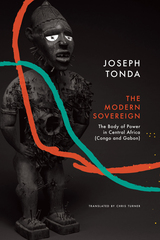
Modern Sovereign
The Body of Power in Central Africa (Congo and Gabon)
Joseph Tonda
Seagull Books, 2020
The “Modern Sovereign,” a notion indebted both to Hobbes’s Leviathan and Marx’s conception of capital, refers to the power that governed the African multitudes from the earliest colonial days to the post-colonial era. It is an internalized power, responsible for the multiform violence exerted on bodies and imaginations. Joseph Tonda contends that in Central Africa—and particularly in Gabon and the Congo—the body is at the heart of political, religious, sexual, economic, and ritual power. This, he argues, is confirmed by the strong link between corporeal and political matters, and by the ostentatious display of bodies in African life. The body of power asserts itself as both matter and spirit, and it incorporates the seductive force of money, commodities, sex, and knowledge. Tonda’s incisive analysis reveals how this sovereign power is a social relation, historically constituted by the violence of the African cultural Imaginary and the realities of State, Market, and Church. It is to be understood, he asserts, through a generalized theory economic, political, and religious fetishism. By introducing this crucial critical voice from contemporary Africa into the English language, The Modern Sovereign makes a significant contribution to field of anthropology, political science, and African studies.
[more]
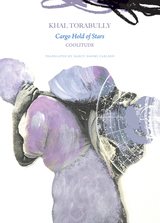
Cargo Hold Of Stars
Coolitude
Khal Torabully
Seagull Books, 2020
Cargo Hold of Stars is an ode to the forgotten voyage of a forgotten people. Khal Torabully gives voice to the millions of indentured men and women, mostly from India and China, who were brought to Mauritius between 1849 and 1923. Many were transported overseas to other European colonies. Kept in close quarters in the ship’s cargo hold, many died. Most never returned home.
With Cargo Hold of Stars, Torabully introduces the concept of ‘Coolitude’ in a way that echoes Aimé Césaire’s term ‘Negritude,’ imbuing the term with dignity and pride, as well as a strong and resilient cultural identity and language. Stating that ordinary language was not equipped to bring to life the diverse voices of indenture, Torabully has developed a ‘poetics of Coolitude’: a new French, peppered with Mauritian Creole, wordplay, and neologisms—and always musical. The humor in these linguistic acrobatics serves to underscore the violence in which his poems are steeped.
Deftly translated from the French by Nancy Naomi Carlson, Cargo Hold of Stars is the song of an uprooting, of the destruction and the reconstruction of the indentured laborer’s identity. But it also celebrates setting down roots, as it conjures an ideal homeland of fraternity and reconciliation in which bodies, memories, stories, and languages mingle—a compelling odyssey that ultimately defines the essence of humankind.
With Cargo Hold of Stars, Torabully introduces the concept of ‘Coolitude’ in a way that echoes Aimé Césaire’s term ‘Negritude,’ imbuing the term with dignity and pride, as well as a strong and resilient cultural identity and language. Stating that ordinary language was not equipped to bring to life the diverse voices of indenture, Torabully has developed a ‘poetics of Coolitude’: a new French, peppered with Mauritian Creole, wordplay, and neologisms—and always musical. The humor in these linguistic acrobatics serves to underscore the violence in which his poems are steeped.
Deftly translated from the French by Nancy Naomi Carlson, Cargo Hold of Stars is the song of an uprooting, of the destruction and the reconstruction of the indentured laborer’s identity. But it also celebrates setting down roots, as it conjures an ideal homeland of fraternity and reconciliation in which bodies, memories, stories, and languages mingle—a compelling odyssey that ultimately defines the essence of humankind.
[more]

Solitary
Maurizio Torchio
Seagull Books, 2018
We learn more every year about the damaging effects of solitary confinement. This unquestionably cruel and unusual punishment leaves prisoners with no human contact, sometimes for years at a time, and it nearly always leads to lasting trauma. In Solitary, Maurizio Torchio takes on the daunting task of narrating this most isolating experience, one in which the captive is not only cut off from society in the walls of a prison, but from human contact itself. Within this closed world seemingly out of time, the prisoner still yearns for human contact. Ultimately, this desire is a form of hope, reminding us that ineluctable human qualities survive even in the most inhumane spaces.
[more]

Terms of Disorder
Keywords for an Interregnum
Alberto Toscano
Seagull Books, 2023
A timely book addressing the burning concerns of our times, from the excesses of capitalism to the global crisis of leadership.
There is widespread agreement, across a voluble political spectrum and around the planet, that we live in times of intensifying insecurity and turmoil. If ours is an age of transition, its direction is anything but certain. Momentous transformations in ecology, geopolitics, and everyday life are shadowed by a suffocating sense of stasis. The limits to capital and the limits of nature are entangled in frightful ways, while the profoundly obsolete form of leadership, domination, and conflict exacerbate an already baleful situation. And yet struggles for liberation have not been quelled. Terms of Disorder confronts this moment by probing some of the defining terms in the modern vocabulary of emancipation, with the aim of testing their capacity to name and orient collective action set on abolishing the present state of things. Ranging from communism to leadership, the eleven keywords addressed in this book provide a set of interlocking points of entry into the common task of forging a political language capable of navigating our disorientation. If, as Gramsci famously noted, the interregnum is a time when the new struggles to be born while the old order is moribund, we may wish to heed Cedric Robinson’s call to “choose wisely among the dying.”
There is widespread agreement, across a voluble political spectrum and around the planet, that we live in times of intensifying insecurity and turmoil. If ours is an age of transition, its direction is anything but certain. Momentous transformations in ecology, geopolitics, and everyday life are shadowed by a suffocating sense of stasis. The limits to capital and the limits of nature are entangled in frightful ways, while the profoundly obsolete form of leadership, domination, and conflict exacerbate an already baleful situation. And yet struggles for liberation have not been quelled. Terms of Disorder confronts this moment by probing some of the defining terms in the modern vocabulary of emancipation, with the aim of testing their capacity to name and orient collective action set on abolishing the present state of things. Ranging from communism to leadership, the eleven keywords addressed in this book provide a set of interlocking points of entry into the common task of forging a political language capable of navigating our disorientation. If, as Gramsci famously noted, the interregnum is a time when the new struggles to be born while the old order is moribund, we may wish to heed Cedric Robinson’s call to “choose wisely among the dying.”
[more]

Collected Poems
Georg Trakl
Seagull Books, 2019
The work of poet Georg Trakl, a leading Austrian-German expressionist, has been praised by many, including his contemporaries Rainer Maria Rilke and Else Lasker-Schüler, as well as his patron Ludwig Wittgenstein, who famously wrote that while he did not truly understand Trakl’s poems, they had the tone of a “truly ingenious person,” which pleased him. This difficulty in understanding Trakl’s poems is not unique. Since the first publication of his work in 1913, there has been endless discussion about how the verses should be understood, leading to controversies over the most accurate way to translate them.
In a refreshing contrast to previous translated collections of Trakl’s work, James Reidel is mindful of how the poet himself wished to be read, emphasizing the order and content of the verses to achieve a musical effect. Trakl’s verses were also marked by allegiance to both the nineteenth and twentieth centuries, a fact which Reidel honors with impressive research into the historicity of the poet’s language.
Collected Poems gathers Trakl’s early, middle, and late work, ranging widely, from his haunting prose pieces to his darkly beautiful poems documenting the first bloody weeks of World War I on the Eastern Front.
In a refreshing contrast to previous translated collections of Trakl’s work, James Reidel is mindful of how the poet himself wished to be read, emphasizing the order and content of the verses to achieve a musical effect. Trakl’s verses were also marked by allegiance to both the nineteenth and twentieth centuries, a fact which Reidel honors with impressive research into the historicity of the poet’s language.
Collected Poems gathers Trakl’s early, middle, and late work, ranging widely, from his haunting prose pieces to his darkly beautiful poems documenting the first bloody weeks of World War I on the Eastern Front.
[more]

Sebastian Dreaming
Georg Trakl
Seagull Books, 2016
The second book in Seagull’s ambitious series of Georg Trakl’s works, Sebastian Dreaming was the second, and final, collection prepared for publication by Trakl himself. Published after his death, it was perhaps even tied to it: forced into a military hospital by the psychological trauma of his World War I experiences, the Austrian poet requested that his publisher send him proofs of the book. He waited a week, and then overdosed on cocaine.
A century later, the book appears for the first time in English. While a number of its poems have been included in other collections, translator James Reidel argues that this particular book deserves to stand on its own and be read as one piece, as Trakl intended. Only by doing this can we begin to see Trakl in his proper time and place, as an early modern poet whose words nonetheless continue to exert a powerful hold on us while we make our way through a new, uncharted century.
A century later, the book appears for the first time in English. While a number of its poems have been included in other collections, translator James Reidel argues that this particular book deserves to stand on its own and be read as one piece, as Trakl intended. Only by doing this can we begin to see Trakl in his proper time and place, as an early modern poet whose words nonetheless continue to exert a powerful hold on us while we make our way through a new, uncharted century.
[more]
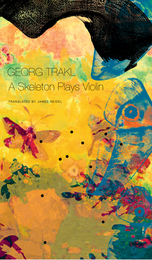
A Skeleton Plays Violin
Book Three of Our Trakl
Georg Trakl
Seagull Books, 2017
The work of poet Georg Trakl, a leading Austrian-German expressionist, has been praised by many, including his contemporaries Rainer Maria Rilke and Else Lasker-Schüler, as well as his patron Ludwig Wittgenstein. Wittgenstein famously wrote that while he did not truly understand Trakl’s poems, they had the tone of a “truly ingenious person,” which pleased him.
A Skeleton Plays Violin comprises the final volume in a trilogy of works by Trakl published by Seagull Books. This selection gathers Trakl’s early, middle, and late work, none of it published in book form during his lifetime. The work here ranges widely, from his haunting prose pieces to his darkly beautiful poems documenting the first bloody weeks of World War I on the Eastern Front.
Book Three of Our Trakl—the series that began with Trakl’s first book Poems and his posthumously published Sebastian Dreaming—also includes translations of unpublished poems and significant variants. Interpolated throughout this comprehensive and chronological selection is a biographical essay that provides more information about Trakl’s gifted and troubled life, especially as it relates to his poetry, as well as the necessary context of his relationship with his favorite sibling, his sister Grete, whose role as a muse to her brother is still highly controversial. Trakl’s life was mysterious and fascinating, a fact reflected in his work. A Skeleton Plays Violin should not be missed.
A Skeleton Plays Violin comprises the final volume in a trilogy of works by Trakl published by Seagull Books. This selection gathers Trakl’s early, middle, and late work, none of it published in book form during his lifetime. The work here ranges widely, from his haunting prose pieces to his darkly beautiful poems documenting the first bloody weeks of World War I on the Eastern Front.
Book Three of Our Trakl—the series that began with Trakl’s first book Poems and his posthumously published Sebastian Dreaming—also includes translations of unpublished poems and significant variants. Interpolated throughout this comprehensive and chronological selection is a biographical essay that provides more information about Trakl’s gifted and troubled life, especially as it relates to his poetry, as well as the necessary context of his relationship with his favorite sibling, his sister Grete, whose role as a muse to her brother is still highly controversial. Trakl’s life was mysterious and fascinating, a fact reflected in his work. A Skeleton Plays Violin should not be missed.
[more]

The Twilight of Politics
Mario Tronti
Seagull Books, 2024
A classic work of political theory by a major twentieth-century figure of the Italian Left.
Italian political thinker Mario Tronti is most famous for being the author of Workers and Capital, which became the central theoretical formulation of Italian operaismo or workerism, a current of political thought emerging in the 1960s that revolutionized the institutional and extra-parliamentary Left in Italy and beyond. In The Twilight of Politics, written originally in 1998, Tronti argues that modern politics, which reached its apogee in the twentieth century, has ended.
Realism and Utopia, Tronti explains, were the foundational qualities of modern politics, which it always tried to clasp together. But behind this highwater mark of politics was a history over the longue durée, encompassing the wars of religion, Hobbes’ Leviathan, revolution, great individuals, and popular movements, as well as innovations such as the nation-state and the party-form. Historically, the modern period is also a coming together of the categories of the political and the laws of political economy. At the heart of this book is Tronti’s attempt to hold together a view of the course of political history with a critique of the “dictatorship of the present” to help us escape being “chained to the bars of an eternal present . . . which deprives us both of the freedom to look back and to see ahead.”
Italian political thinker Mario Tronti is most famous for being the author of Workers and Capital, which became the central theoretical formulation of Italian operaismo or workerism, a current of political thought emerging in the 1960s that revolutionized the institutional and extra-parliamentary Left in Italy and beyond. In The Twilight of Politics, written originally in 1998, Tronti argues that modern politics, which reached its apogee in the twentieth century, has ended.
Realism and Utopia, Tronti explains, were the foundational qualities of modern politics, which it always tried to clasp together. But behind this highwater mark of politics was a history over the longue durée, encompassing the wars of religion, Hobbes’ Leviathan, revolution, great individuals, and popular movements, as well as innovations such as the nation-state and the party-form. Historically, the modern period is also a coming together of the categories of the political and the laws of political economy. At the heart of this book is Tronti’s attempt to hold together a view of the course of political history with a critique of the “dictatorship of the present” to help us escape being “chained to the bars of an eternal present . . . which deprives us both of the freedom to look back and to see ahead.”
[more]

Pixel
Krisztina Tóth
Seagull Books, 2018
Like stars in the sky, pixels may seem like tiny, individual points. But, when viewed from a distance, they can create elaborate images. Each pixel contributes to this array, but no individual point can create the whole. The thirty stories that comprise Krisztina Tóth’s book similarly produce an interconnected web. While each tale of love, loss, and failed self-determination narrates the sensuousness of an individual’s life, together, the thirty stories tell a more complicated tale of relationships. Circumstances that appear unrelated may converge in harmony or in heartbreak, just as the events that loom largest may fail to produce a longed-for outcome. These threads often determine the course of lives in unpredictable ways—sometimes comic, sometimes tragic, but rarely in the ways we originally anticipated.
[more]
READERS
Browse our collection.
PUBLISHERS
See BiblioVault's publisher services.
STUDENT SERVICES
Files for college accessibility offices.
UChicago Accessibility Resources
home | accessibility | search | about | contact us
BiblioVault ® 2001 - 2024
The University of Chicago Press









